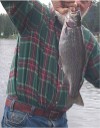Life at the Lake
a diary of living at a small lowland lakeWHAT IT'S LIKE

Early moonrise over Lake Ketchum
|
Archive Search |
| Links |
|
and s-integrator |

Spider at my window "monitors" the lake
Today, as lake monitor for this lake for the county, Snohomish, I must row my boat out and take a complex series of readings, clear down to the bottom, using various instruments, including a very clever one manufactured by Aquatic Research Instruments and another called a LaMotte Dissolved Oxygen (Testing Kit) Model EDO, Code 7414.
Sounds rather impressive, don't it?
The former is a bit intimidating—a heavy Plexiglas tube, with a spring and rubber plug on each end capable of, when triggered by a weight dropped down its long cord, trapping lake water at various depths, in my case down to about 6 meters (though I stop at 5 in order to keep from picking up bottom muck).
"Bottom muck" is not its technical name, mind you. It is one coined by Yours Truly to designate the awful stuff on the lake bottom that is properly called Gunk. No, it's not that, either. It has no name, like the monster from outer space that threatens America.
It the part of the lake that contains next to zero dissolved oxygen, which means it is water that cannot sustain life of any creature, be it fish, invertebrate, plankton, weed. But some Chironomidae larvae manage to live there—snaky little worms that hatch into midge flies that rise to the surface at dusk, and at other times, and flutter away.
It also houses much of the phosphorous that is not in suspension in the lake—vast, smothering quantities that enrich the lake unhealthily from year to year.
Today I also measure chlorophyll, top and bottom level phosphorous concentrations, water clarity (or visibility), temperatures and various levels (for the lake is "stratified," temperature-wise), vegetation, algae scum, and various other visual observations, such as wind, clouds, ducks and geese, and water color.
It is unglamorous necessary work, but it keeps running tab under the Clean Water Act and the enabling federal Environmental Protection Act of how we are doing from the standpoint of water quality.
Much volunteer work such as lake monitoring is no longer being funded by the Feds for philosophical and political reasons. So soon "lacunae" and "date gaps" are going to start appearing nationally in monitoring programs deemed necessary by Congress to improve the quality of life in Deteriorating America.
Then not only will we not know how we are doing, we will not be doing anything to improve our rapidly diminishing lot—our common situation.
Often, on such a nice day, when other things beckon, I resent having to do this. No martyr, I. If it was a job, and I were being paid what it is worth to do this, I would charge a nice lot of money.
Say, fifty bucks an hour. And it is over two hours worth, counting the lab time.
- - Comments ()
...

A big rainbow, ready to spawn, and gently released
Ah, trout! It is one reason we've chosen to live on a lowland lake. I wish they could find an inlet stream in which to spawn and reproduce themselves, but, alas, there isn't any, so we are dependent on the State DF&W for annual stocking of rainbows.
They deed us a flat one-thousand. By exercising catch-and-release fishing mostly, we stretch that number to produce a season of pretty darned good fishing. On a good day, I can catch several right off my dock, making taking the boat out on the lake unnecessary. And because my pair of Black Labs enjoy it so, I am inclined to fish right here at home, rather than pile them in the 12-foot boat for a ride that might be wetly precarious.
Their enjoyment is fully half of mine; that is, their contribution is. The male, Biff, goes absolute bananas, and has to be leashed to a post to keep him from calculatingly diving in and retrieving the fish. He rarely misses, even though he must go under to trap the trout firmly in his "soft" mouth. (Hunters know what this means.)
I admit, every once in while I let him nail one. He swims ashore with it, on command, and drops it, on command, and stands back, on command, while I free the fish from the hook and carry it myself, with my own soft hands, out along the dock and lower it into the water. I then "recover" the fish for a few moments, sometimes working it back and forth through the water with one hand cradling its belly, until it swims away with a strong, confident motion.
Yesterday, three, none of them large, though. I have been arrested at 15 big trout so far this year. This is fish in the 15-21 inch range. They would weigh a pound-and-a-half to three-and-a-half pounds, I should guess. Though I never weigh or truly measure their length.
- - Comments ()
...

Locally grown strawberries, the best
Since late winter my wife has brought home from the grocery store boxes of imported strawberries. Some of the individual berries are huge. They are appealingly bright and red. They taste. . . terrible.
The first berries came from Mexico. (It's not true that they use human excrement for fertilizer.) Then, a bit later, they came from the lush winter fields of Southern California. They too were huge, red, and awful, more like a potato than a strawberry. You'd cut off their green tops and begin to slice them and they were dense white inside, very unstrawberry like. And the taste? Like nothing.
My wife too raises strawberries, mainly because she believe I adore them. Her bed for strawberries is about ten by fifteen feet in size, and the plants grow thick and lust; you actually have to dive to find the berries, and often the garden slugs have beaten you there (often a slug is still there, having his lush desserts) and you find him (or her, as the case may be, if slugs have sex, or gender, or both, as again the case may be) still there, dining.
The berries began blooming their tiny blossoms a month ago. I noticed them. Last night my wife said, "If you'd like a strawberry or two for dessert, I think you might find some in the garden." She said this softly, with a throw-away cadence.
Then she stepped back so that she might not get trampled.
I found them and picked about a dozen. They were small and some of them still pinkish, not bright red. But, I learned, a pink, home-grown berry is riper and more tasty (and less white inside) than a berry imported from Mexico or SCal.
They were memorably delicious, and the first bite took this Proustian character back, back, to the wild June berries I used to detect and bend way over to pick on my way in to fish the Boulder Creek run on my favorite stream, the North Fork.
They grew in sand, and the sand was deposited and replaced by winter flooding, but the tiny plants grew up through the silt and put out their tiny, precarious fruits concurrent with the start of the summer steelhead season.
I was careful never to pick more than three or four berries. I said they were tiny, but they were incredibly sweet. My secret, and the river's. Then one year I found a family with buckets harvesting the entire crop. They looked up at me from communal stoop and sickishly (or so I thought) smiled. I smiled knowingly sickishly back and strode on.
After that I did not return because, concurrently, covert private access to the river was cut off for visiting fishers, both here and at many other places along good fishing holes. This is the price one pays with age for lost opportunities and lost memories. The rights of private ownership of large land holdings and certain over-development of what the land can bear combined to produce our local version of "the tragedy of the commons."
That is to say, certain wonderful things are no longer there.
But now have my private strawberry bed (I know: it is my wife's, along with the huckleberries, blueberries, and raspberries she grows and I contribute to by eating) and can sidle down as of an evening and pluck a few. And I suppose—nostalgia aside—this is even better than in the storied and irretrievable past.
- - Comments ()
...

Drawing, Flock of Goldeneyes
Hubris, anyone?
First its one football coach, then another. What is it about the job that causes them to fall victim of the ancient Greek curse of excessive pride or arrogance? Is it the big money that goes along with the job, or is it something inherent in the character (contemporary American or the Greece of Sophocles's time) that makes the person of "high estate" fall that tragic distance that is often loosely called tragic?
First Washington State football coach Mike Price—for those mentally out of town for a year or so—be unable to handle the big money and prestige of a big-time football school, Alabama, and participate in drunken orgy, complete with dancing girls (an euphemism, if I've ever used one) and lose his job summarily. And the huge disproportionate paycheck that goes along with it.
Now it is Rick Neuhisel at sister-school Washington, my alma mater. Admittedly the circumstances are different, or on the surface seem so. But are they, really? With Mike (I've read about him so much, and seen him on TV so often, I feel we are on a first-name basis; call me "Bob," Mike) it was partying, and perhaps he was set-up, as tragic victims usually claim they were.
With Rick ("call me Bob, Rick"), it was gambling, which is against the NCAA rules, no matter how you may view them and twist them around in your mind. He participated in a group-of-golfing-buddies pool in betting on the outcome of college basketball playoffs, something which this gambling-obsessed nation of ours indulges in most frequently. And he too, now on the cusp of disaster, that is, losing a home valued at about 12 million dollars and a job that brings in two per year, along with a "forgivable" loan of nearly a couple of million more, if he holds his job for eight years.
Seaplanes bearing top national athletes land at his dock on Lake Washington during recruiting season and the coach ushers them inside for a catered dinner—no more. And the house, along with the monthly paychecks larger than most of us will make in a lifetime, will be gone, gone, gone. It is all hanging by a thread, and slated soon to disappear as though a gossamer dream.
We have enough unemployed around here at present. What's one more? Except this one comes crashing down from high to low estate, and the adoring public . . . cheers. And that is what tragedy is all about, folks. We get to watch and vicariously thrill at the sight and sound of the . . . plunge.
When I was a freshman, taking English, and not so long afterwards, a graduate student teaching the same course in composition, a favorite theme to engage the minds of callow youth was to pose the question, "What if our university abandoned its football team and devoted its time and money to more appropriate academic goals?"
You were to take a side and argue passionately one way or the other. You'd be graded according to how well you made your case and theoretically "persuaded" the reader you were right.
Good idea, but not a single theme ever came in on the side of abandoning football on the college level. The arguments varied from the rational to the absurd—"what else are we going to do, on a given Saturday afternoon in autumn?"
The arguments today are the same, but the salaries and monetary packages have grown huge by any standard other than Hollywood. The football coach makes more money than the university president and the athletic director, who have the power to fire him, if they dare. If he is not too powerful for them to dare the consequences, for the coach has powerful friend, friends who have an will donate money in various forms to that institution.
Which brings us back to hubris. It is not an ancient Greek word meaning overbearing pride or presumption. It is a word that has become uniquely American. If you don't believe me, ask my friend, Oedipus. He too was king.
- - Comments ()
...

June brings forth a plethora of small red roses
A hundred successive blog entries under our belt, it is time to think of a brief respite. That is, a vacation.
Just checked the statistics column of BlogStudio and learned that I've had 15 hits so far this day, and it is only ten in the morning. Not so many, really, in a blogsite that is world-wide, it is still encouraging. So, here comes another blog. No vacation today, dear readers.
Our lake, by court order, is to be maintained by a water gate set at 19 inches above the bottom of the culvert that drains the lake into a tiny, intermittent (this means it doesn't flow year-round and dries up in mid -summer) stream.
The water level is presently about half an inch above the ceramic spacer that can be inserted in the water gate to control the height. It is set at the prescribed 19 inches. So water is flowing out of the lake, through a culvert running along the property line of a house, and down a hillside, to where it enters a long, flat ditch that, if not absorbed into the dry, dry farming land, will eventually trickle into Skagit Bay, more than a mile away.
All of which means little, except for the fact that the lake is lowering dramatically and alarmingly. It proves, in point of fact, not so much and not so alarming. A draw-down such as this one is normal for this time of the year, though it always arrives as a surprise.
The lake will soon halt its hot-weather plunge and then lower very slowly due to evaporation. Our lake is by its very nature and geology shallow—no more than five or six meters in depth. So we need to keep it as high as possible, though there are many lake residents who like it low because it gives them a big beach, valuable when grandchildren make a rare but welcome visit.
Each year the vegetation that dies naturally or from being treated with the approved pesticide, Sonar, accumulates on the bottom of the lake. It looks like fine silt, but proves to be airy and have no real substance. If you step on what appears to be sand, you will sink into it for a depth of a few inches.
What does this mean? Probably that we will have to raise the desired level of the water gate an inch or two to accommodate the sad fact that the lake is getting shallower.
It is shallower because the bottom is slowly rising, a fraction more each year.
- - Comments ()
...

Yellow pond lily, a desireable weed if not grown excessively
A man named Sande proposes to dig a sand and gravel pit a few hundred yards away from the lake, to the West, and down a steep slope. (If this were fiction, I couldn't possibly attribute a name like "Sande" to a man who wants to mine sand (let alone gravel) from his land. But this being non-fiction, I must.)
The officers of our lake association, all elderly women except for a male retired lawyer, temporarily out of the country, is trying to raise money for a newly hired environmental lawyer, unknown to the rest of us, to fight the permitting process for the Pit, and has been told that several tens of thousands of dollars won't nearly be enough to hire all the professional witnesses required to testify in court, and to pay his fee.
So the officers want to tap the LID money that is legally earmarked for ensuring the lake's water quality for this purpose, even though the Pit doesn't effect the lake and its water even remotely. (There is one possibility I raised that because it is downslope, the Pit might cause the lake to drain out through the 50-foot hole produced by fifteen or more years of excavation. I call this the Siphon Effect, and it is unknown to modern physics. It is a wildcard guess as what remotely might happen, though a disastrous one. The LID money could feasibly be used to hire a geo-technical engineer to look into this aspect, but not for any other.)
So there is a series of meetings planned for early and mid-July to raise money, and neighbors not on the lake itself, but near to the Pit, are being asked to contribute $1000 each for the legal defense. There are 21 such families, none of them rich, to whom that would be a lot of money, in these economically hard times. It will be interesting to see how they respond.
The LID assessment is based on the number of lakefront footage an owner possesses. This is because the money is to protect the lake based on its amount of shoreline. The annual fee has been $2 a front foot for a number of years, which is enough for two Sonar treatments of the water. When we do only one such treatment, or none, the money accumulates. Now the officers want to use the accumulation to pay legal fees.
The lawyer says we don't have enough money yet. We need more. It is an open-purse approach, not known to various governmental entities. You "throw" money at a problem.
A few of us fear use of the LID money is not fair or representative. It is probably even illegal, though chances are small that anyone will take them to court ("What, court again?") to contest the point. So there we stand at present, in early June, as the battle looms, and more money is being requested.
I have an idea. Why don't those officers of the lake association each pledge, as starters, the $1000 apiece they are asking those other 21 homeowners away from the lake to contribute? It would be a sign of good faith and that they are personally willing to put their own money where their collective mouth is, and not the money other's have contributed according to law to keep the lake free from excessive weeds.
- - Comments ()
...

Southwest end of the lake
Last night we went for a boat ride, my wife and I. It was a hot Saturday night, and the lake was dotted with visiting boats, and after dinner I suggested a ride, and she agreed.
Usually she doesn't. But this year she is on the Water Board, and seems to be chairperson of it. And it is a good idea to make a lakefront inspection, every once in a while, for a person sees the lake differently than from a walk around the lake on the frontage road.
First thing we noticed was an abundance of pondweed. This is natural, but we will soon have the lake "treated" with the pesticide, Sonar, and this ought to kill or drastically cut back the yellow pond lily, cinqueweed, and water smart weed.
I wish it wasn't so, but the lake is so enriched with phosphorous from a nearby dairy farm that if we didn't treat the lake it would be bank-to-bank with duckweed and elodea in a couple of seasons. So we reluctantly pool our special tax money with that of other residents and authorize use of the herbicide, the only one until recently permitted by the state Department of Ecology.
There is a watergate at the West end of the lake, and we had to inspect it and see that it was functioning at the correct height. It was spilling water out, and the lake is now lowering alarmingly rapidly, because of the heat, so my wife thinks maybe we ought to do a visitation by foot and take a true measurement. The lake, according to court order, needs to be kept at 19 inches above the bottom of the culvert, and not lower. If lower, the lake will be shallower, warmer, and more weed and algae will grow.
A fine home on the South end of the lake was recently sold and a new family moved in last week. Either it is a large family, or else they were having a house-warming party, for there was more than a dozen people swarming all over the lawn and dock, swimming and fishing, and in general having a fine time of it.
I called out to them and asked if they had just bought the house, and they said they had, and we exchanged names, and names of possible friends living nearby. Then I continued my rowing against a decided breeze (perhaps portending a cooling trend the following day) and made our way slowly back home.
It feels good to pull on the oars again, and I realized I had missed it, and should take the boat out more often. And my wife, too. It is good for both of us.
- - Comments ()
...